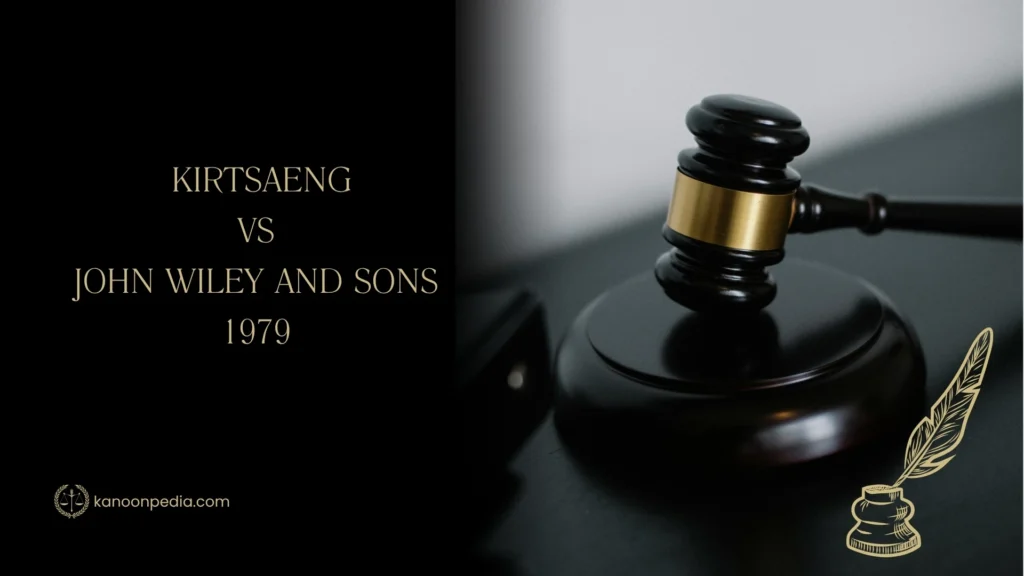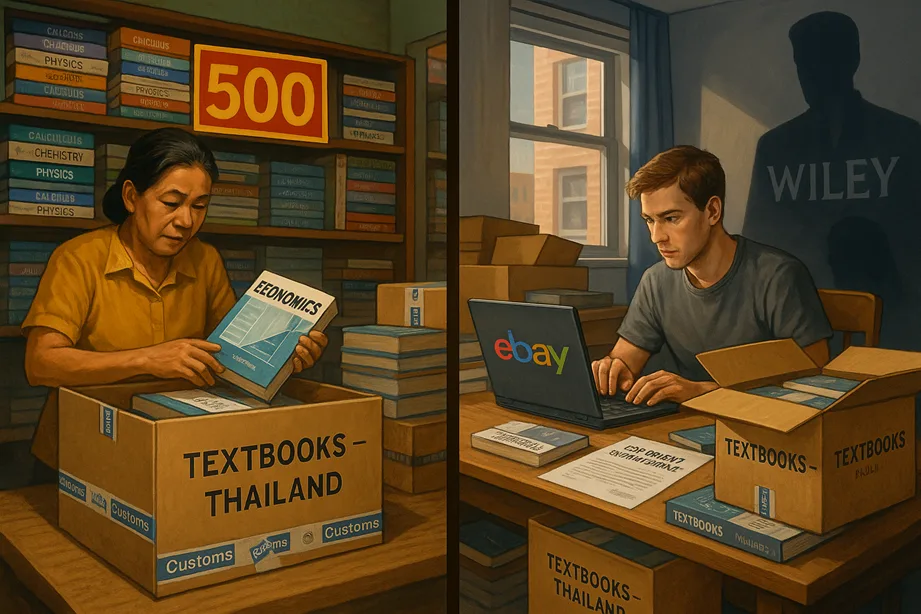Overview of the Kirtsaeng vs John Wiley and Sons 1979 Landmark Decision
The Kirtsaeng vs John Wiley and Sons 1979 case represents one of the most significant copyright law decisions in recent legal history, fundamentally reshaping how courts interpret the first-sale doctrine and attorney fee awards in copyright litigation. This landmark case, which actually culminated in two separate Supreme Court decisions (2013 and 2016), emerged from a textbook arbitrage scheme that challenged the boundaries of copyright protection in our increasingly globalized economy.

Table of Contents
Background and Key Players in Kirtsaeng vs John Wiley and Sons 1979
Supap Kirtsaeng, a Thai mathematics student at Cornell University, discovered that John Wiley & Sons published nearly identical English-language textbooks in both Thailand and the United States, but at significantly different price points. The textbooks sold in Thailand cost a fraction of their U.S. counterparts, creating an arbitrage opportunity that Kirtsaeng exploited by having family and friends purchase the foreign editions and ship them to New York for resale to American students.
This business model generated substantial profits for Kirtsaeng, who made approximately $1.2 million in revenue from selling imported textbooks on eBay. However, it also triggered a copyright infringement lawsuit from Wiley, who argued that Kirtsaeng’s unauthorized importation and resale violated their exclusive distribution rights under 17 U.S.C. §§ 106(3) and 602(a)(1).

The First-Sale Doctrine and Its Global Application
Understanding the First-Sale Doctrine
The first-sale doctrine, codified in 17 U.S.C. § 109(a), fundamentally limits copyright holders’ distribution rights by allowing lawful owners of copyrighted works to resell or dispose of their copies without the copyright owner’s permission. This doctrine serves as a crucial balance between intellectual property rights and the free flow of commerce, enabling used book markets, library lending, and various secondary markets for copyrighted works.
The Geographic Question in Kirtsaeng vs John Wiley and Sons 1979
The central legal question in the Kirtsaeng vs John Wiley and Sons 1979 case was whether the first-sale doctrine applied to copyrighted works manufactured abroad. Federal courts were divided on this issue, with the Second Circuit initially ruling that the doctrine only protected works manufactured in the United States.
The Supreme Court’s 2013 decision definitively resolved this split, holding 6-3 that the first-sale doctrine applies to copies of copyrighted works lawfully made abroad. Justice Breyer’s majority opinion emphasized that Section 109(a) contains no geographical limitations, and imposing such restrictions would create practical problems for libraries, consumers, and the global flow of goods.
The Attorney Fee Controversy and Second Supreme Court Decision
Section 505 of the Copyright Act and Fee-Shifting
Following his victory in the first Supreme Court decision, Kirtsaeng returned to the district court seeking more than $2 million in attorney’s fees under Section 505 of the Copyright Act. Section 505 provides discretionary authority for courts to “award a reasonable attorney’s fee to the prevailing party,” but without specifying standards or guidelines for when such awards are appropriate.
The Objective Reasonableness Standard
The district court denied Kirtsaeng’s motion, placing “substantial weight” on the objective reasonableness of Wiley’s copyright infringement claim. The court reasoned that Wiley’s position was reasonable because several Courts of Appeals and three Supreme Court Justices had agreed with it. The Second Circuit affirmed this decision, leading to the second Supreme Court review in the Kirtsaeng vs John Wiley and Sons 1979 litigation.
The 2016 Supreme Court Decision on Attorney Fees
In a unanimous decision written by Justice Elena Kagan, the Supreme Court established that district courts should give “substantial weight” to the objective reasonableness of the losing party’s position when deciding whether to award attorney’s fees, while still considering “all other relevant factors”. The Court emphasized that objective reasonableness should be “an important factor” but not “the controlling one” in fee determinations.
Legal Framework and Precedent Analysis
The Fogerty Foundation
The Court’s analysis in Kirtsaeng vs John Wiley and Sons 1979 built upon the framework established in Fogerty v. Fantasy, Inc. (1994), which identified several non-exclusive factors for courts to consider when awarding attorney’s fees: frivolousness, motivation, objective unreasonableness, and the need to advance considerations of compensation and deterrence.
Balancing Copyright Act Objectives
The Supreme Court emphasized that fee-shifting decisions must serve the broader objectives of the Copyright Act, which seeks to “enrich the general public through access to creative works” by encouraging authors’ creations while enabling others to build upon that work. The Court found that the objective reasonableness standard supports these goals by encouraging parties with strong legal positions to stand on their rights while deterring frivolous litigation.
Practical Implications for Copyright Litigation
Risk Assessment and Settlement Dynamics
The Kirtsaeng vs John Wiley and Sons 1979 decisions have significantly impacted how parties assess litigation risks and structure settlements in copyright cases. The emphasis on objective reasonableness provides greater predictability for parties considering whether to pursue or defend copyright claims, while the requirement to consider all relevant factors preserves necessary judicial flexibility.
Impact on International Trade and Publishing
The first-sale doctrine ruling has profound implications for international trade in copyrighted goods. Publishers can no longer use copyright law to maintain strict geographical price discrimination for physical books, as consumers and resellers can legally import and resell foreign-made copies. This has forced publishers to reconsider their global pricing strategies and distribution models.
Frequently Asked Questions
What is the Kirtsaeng vs John Wiley and Sons 1979 case about?
The u003cstrongu003eKirtsaeng vs John Wiley and Sons 1979u003c/strongu003e case involved a Thai student who imported low-cost textbooks from Thailand and resold them in the United States. The case resulted in two Supreme Court decisions addressing the first-sale doctrine’s application to foreign-made goods and attorney fee awards in copyright litigationu003ca href=u0022https://www.quimbee.com/cases/kirtsaeng-v-john-wiley-sons-inc-579-u-s-197-136-s-ct-1979-2016u0022 target=u0022_blanku0022 rel=u0022noreferrer noopeneru0022u003eu003c/au003eu003ca href=u0022https://en.wikipedia.org/wiki/Kirtsaeng_v._John_Wiley_u0026amp;_Sons,_Inc.u0022 target=u0022_blanku0022 rel=u0022noreferrer noopeneru0022u003eu003c/au003e.
How does the first-sale doctrine apply to foreign-made goods?
The Supreme Court held that the first-sale doctrine applies to copies of copyrighted works lawfully made abroad, just as it does to domestic works. There is no geographical limitation in the Copyright Act that restricts the doctrine to works made in the United Statesu003ca href=u0022https://en.wikipedia.org/wiki/Kirtsaeng_v._John_Wiley_u0026amp;_Sons,_Inc.u0022 target=u0022_blanku0022 rel=u0022noreferrer noopeneru0022u003eu003c/au003eu003ca href=u0022https://supreme.justia.com/cases/federal/us/568/519/u0022 target=u0022_blanku0022 rel=u0022noreferrer noopeneru0022u003eu003c/au003e.
What is the Kirtsaeng vs John Wiley and Sons 1979 case about?u003cbru003e
Courts must give substantial weight to the objective reasonableness of the losing party’s position while considering all other relevant factors, including frivolousness, motivation, and the need to advance considerations of compensation and deterrenceu003ca href=u0022https://www.quimbee.com/cases/kirtsaeng-v-john-wiley-sons-inc-579-u-s-197-136-s-ct-1979-2016u0022 target=u0022_blanku0022 rel=u0022noreferrer noopeneru0022u003eu003c/au003eu003ca href=u0022https://supreme.justia.com/cases/federal/us/579/15-375/u0022 target=u0022_blanku0022 rel=u0022noreferrer noopeneru0022u003eu003c/au003e.
Can copyright holders prevent importation of their works made abroad?
No, copyright holders cannot use their exclusive distribution rights to prevent importation of lawfully made copies from abroad. Once a work is lawfully sold anywhere in the world, the first-sale doctrine allows the purchaser to resell it without the copyright owner’s permissionu003ca href=u0022https://en.wikipedia.org/wiki/Kirtsaeng_v._John_Wiley_u0026amp;_Sons,_Inc.u0022 target=u0022_blanku0022 rel=u0022noreferrer noopeneru0022u003eu003c/au003eu003ca href=u0022https://supreme.justia.com/cases/federal/us/568/519/u0022 target=u0022_blanku0022 rel=u0022noreferrer noopeneru0022u003eu003c/au003e.
What is the significance of u0022objective reasonablenessu0022 in attorney fee decisions?
Objective reasonableness is an important factor that courts must consider when deciding whether to award attorney’s fees, but it is not controlling. The standard encourages parties with strong positions to litigate while deterring frivolous claimsu003ca href=u0022https://www.quimbee.com/cases/kirtsaeng-v-john-wiley-sons-inc-579-u-s-197-136-s-ct-1979-2016u0022 target=u0022_blanku0022 rel=u0022noreferrer noopeneru0022u003eu003c/au003eu003ca href=u0022https://supreme.justia.com/cases/federal/us/579/15-375/u0022 target=u0022_blanku0022 rel=u0022noreferrer noopeneru0022u003eu003c/au003e.
How has the Kirtsaeng decision affected international publishing?
The decision has made it difficult for publishers to maintain significant price differences between domestic and foreign markets for the same copyrighted works, as consumers can legally import and resell foreign editionsu003ca href=u0022https://www.brookings.edu/articles/the-first-sale-doctrine-and-its-impact-on-the-music-business/u0022 target=u0022_blanku0022 rel=u0022noreferrer noopeneru0022u003eu003c/au003eu003ca href=u0022https://dunnerlaw.com/supreme-court-upholds-copyright-first-sale-doctrine-to-copyrighted-works-manufactured-overseas/u0022 target=u0022_blanku0022 rel=u0022noreferrer noopeneru0022u003eu003c/au003e.
Conclusion
The Kirtsaeng vs John Wiley and Sons 1979 case stands as a pivotal moment in copyright law, establishing clear precedent for the global application of the first-sale doctrine and providing essential guidance for attorney fee awards in copyright litigation. The decisions balance the need to protect intellectual property rights with the practical realities of global commerce and the public’s interest in accessing creative works.
These rulings have fundamentally altered the landscape of copyright enforcement, international trade in copyrighted goods, and litigation strategy in intellectual property cases. The emphasis on objective reasonableness in fee-shifting decisions provides greater predictability while preserving judicial discretion, creating a more balanced framework for resolving copyright disputes. there is also an interesting case on copyright tussle on digital libraries.
As the digital economy continues to evolve, the principles established in Kirtsaeng vs John Wiley and Sons 1979 will likely continue to influence how courts interpret copyright law’s boundaries and balance the competing interests of creators, distributors, and consumers in our interconnected world.
you may also read about Olga Tellis vs Bombay Municipal Corporation 1985 Landmark Case on Right to Livelihood and Shelter
[…] The enduring relevance of Towards a Theory of Criminal Legislation by Andrew Ashworth in contemporary legal discourse demonstrates the importance of principled approaches to criminal law-making. As societies continue to grapple with new forms of crime and evolving social challenges, Ashworth’s framework provides essential guidance for maintaining the delicate balance between effective crime prevention and protection of individual rights. The theory’s influence on constitutional developments, academic scholarship, and practical law reform efforts ensures its continued significance in the ongoing evolution of criminal justice systems worldwide. You may also be intrested in reading The Kirtsaeng vs John Wiley and Sons 1979 Case […]
[…] The Authors Guild vs HathiTrust case represents a watershed moment in copyright law, demonstrating that fair use in digital libraries can accommodate technological innovation while protecting creators’ rights. By focusing on functional transformation and public benefit rather than rigid formalism, the decision created space for libraries to serve their communities in the digital age while respecting the fundamental principles of intellectual property law. Read about the landmark judgement The Kirtsaeng vs John Wiley and Sons 1979 Case: A Comprehensive Analysis of Copyright Law and Attorn… […]